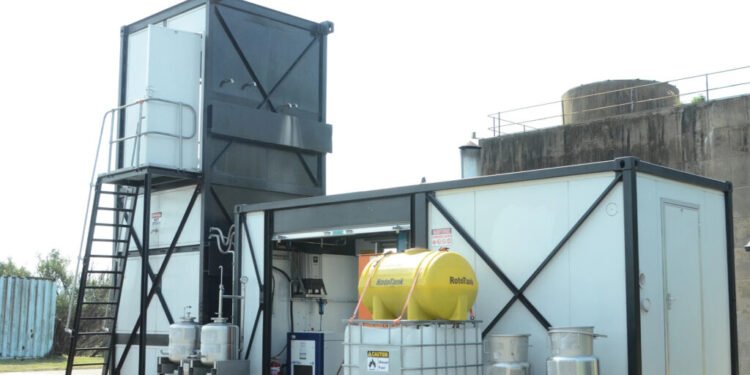We have the waste, and now we have another solution for it. Converting cellulose fibre-rich waste from pulp and paper mill operations into ethanol using a specialised fermentation process. Ethanol is a versatile starting material used in industrial chemicals, bio-based plastics and sustainable aviation fuel.
The breakthrough
Government officials, media and industry partners at Sappi Tugela mill in Mandini, KwaZulu-Nata were all present at the unveiling of a demonstration plant, co-funded by the Department of Science and Innovation (DSI) and the Paper Manufacturers Association of South Africa (PAMSA).
This project comes together through a collaboration between the Paper Manufacturers Association of South Africa (PAMSA), Stellenbosch University (SU), Sappi Southern Africa and Mpact.

Demonstration bioethanol plant
Less waste, more space
Diverting solid waste away from landfills has been the priority of effective waste management for some time, so this new process is a breakthrough that works with ongoing projects to ensure the future of waste management in South Africa.
Paper sludge is a solid waste with a high moisture content. It comes from the production of paper using virgin wood fibre and/or recycled paper collected from the paper mill wastewater treatment systems.

“This technology started as a research project and thesis by one of our Masters in Engineering students and today we have a South African first. Bioethanol comes with many environmental credentials and further contributes to the circularity of the pulp and paper sector,” explains Jane Molony, PAMSA executive director.
The process
This demonstration plant is the result of ten years of research. Paper sludge, as well as food and textile waste, does not require pre-treatment before hydrolysis-fermentation. This solution will help to reduce the amount of waste disposed to landfill and the associated greenhouse gas emissions and improve water reclamation for re-use, further contributing to the circular economic and industrial decarbonisation.
A “ready-to-go solution”, this plant aims to demonstrate the commercial readiness of the fermentation technology under industrial conditions.

Paper pulp
Economic possibilities
Waste-derived bioethanol commands premium prices in global markets, and this project has the potential to generate sustainable employment, which is much needed in South Africa.
This project also signals to the world that South Africa is firmly committed to the circular economy.








![[REBROADCAST] Dreams, Homes, and a Distorted Legacy: Hajar Yazdiha & Steve Stinson](https://lbnntv.com/wp-content/uploads/2024/02/REBROADCAST-Dreams-Homes-and-a-Distorted-Legacy-Hajar-Yazdiha-amp-120x86.jpg)
